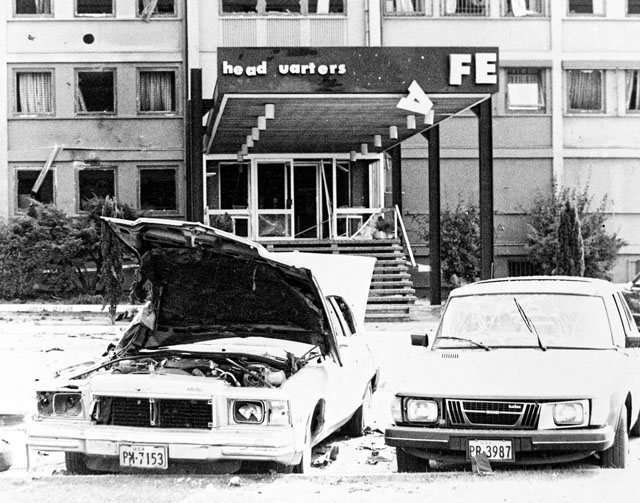
Two bombs exploded in a parking lot outside the U.S. Air Forces in Europe headquarters building at Ramstein Air Base, Aug. 31, 1981, injuring 15 people. When they heard the blasts, Air Force dentists and their staff ran out to help.
The bombs, placed in cars by anti-American terrorist group, the Red Army, detonated early in the morning, shattering windows, starting fires, and damaging partitions, interior walls, equipment, and furniture in the headquarters. One blast blew a car hood over a five-story building.
Within seconds, two dental officers and four enlisted staff rushed to the site from the dental clinic located across the street from the blast. While one officer searched the parking lot for survivors, the other officer and staff entered the burning building and helped move victims to safety.

A few minutes later, more members of the dental clinic staff arrived and escorted the injured to the clinic. The senior dental officer and oral surgeon turned the waiting room into a triage and treatment center. The dental staff cleared routine dental patients from the room, moved chairs up against the walls, wheeled in IV drips, and prepared bandages and compresses. They then assisted victims in, while an enlisted member established communications with the medical command post.
The dental teams encountered many challenges while rescuing and treating the wounded. Several people inside USAFE headquarters refused to leave until they had called home, despite fire and a collapsing ceiling. In the triage center, two people became hysterical after what they had witnessed.
Of the 15 wounded, dentists treated two victims on the spot and accompanied them by ambulance to a hospital. One patient suffered an open chest wound and a fractured femur, while another suffered cuts to the face and around the eyes. Six were treated in the dental clinic and escorted to the base medical facility for follow up. The rest were immediately transported to the medical facility.
This swift and professional response to an unforeseen tragedy demonstrates the long-standing Air Force Medical Service commitment to the patient, now embodied by AFMS Trusted Care culture, and the importance of always being ready to deliver care. These principles still drive medical Airmen today.


